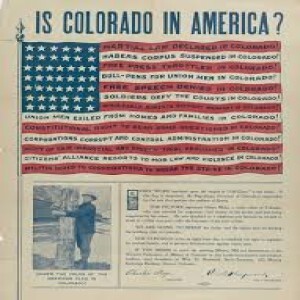

On this day in labor history the year was 1909.
That was the day the United States Supreme Court decided the case of Moyers v. Peabody.
The case grew out of the Colorado Labor Wars, a series of back-to-back strikes in 1903 and 1904 in precious metals mines and ore mills.
The Colorado National Guard meted out violent assaults, arrests and deportations against strikers, often on orders from Governor James Peabody.
The state militia routinely rounded up strikers and union leaders, detained them for weeks in bullpens and ignored habeas corpus petitions.
Western Federation of Miners president, Charles Moyer arrived in Telluride during a strike to find these repressive conditions.
He signed a poster that read, “Is Colorado in America?”
The poster included an image listing the many violations of basic democratic rights on the American flag.
Moyer was arrested in March 1904 for desecration of the American flag on the poster.
He was detained on the grounds of military necessity, even after the courts ordered his release.
His case traveled through the state and federal courts until the Supreme Court ruled.
They held that “the governor and officers of a state National Guard, acting in good faith and under authority of law, may imprison without probable cause a citizen of the United States in a time of insurrection and deny that citizen the right of habeas corpus.”
The ruling radicalized the labor movement.
Many concluded there could be no justice through the court system.
A later case successfully challenged the ruling on the basis that claims of insurrection were subject to judicial review.
The ruling, however controversial, still stands and was invoked after 9/11 in the 2004 ruling Hamdi v Rumsfeld.
More Episodes
All Episodes>>You may also like
Create Your Podcast In Minutes
- Full-featured podcast site
- Unlimited storage and bandwidth
- Comprehensive podcast stats
- Distribute to Apple Podcasts, Spotify, and more
- Make money with your podcast











